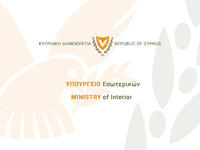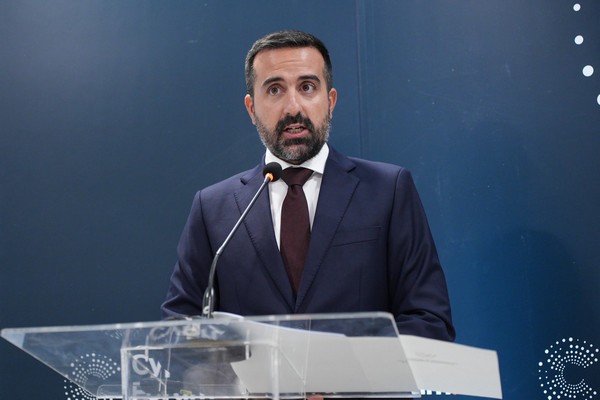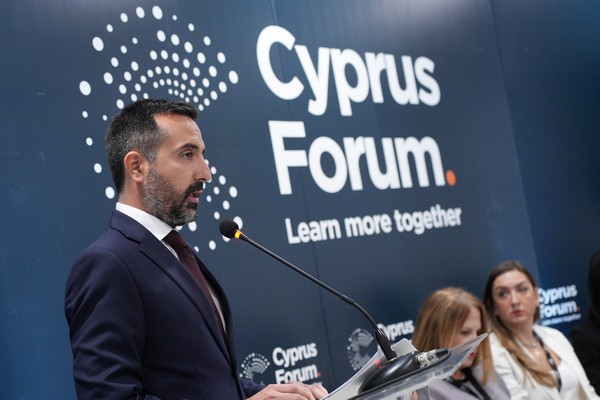Press Releases
03-10-2024 18:56
Keynote speech by the Deputy Minister of Migration and International Protection, Dr Nicholas A. Ioannides at a panel discussion on “Managing Irregular Migration in Cyprus: Policy, Law and Human Rights in the Buffer Zone and the Sea”, at the 5th Cyprus For
In many respects, we live in an era of uncertainty in terms of migration concerning both our region and the entire globe. Therefore, even though the numbers of irregular arrivals have decreased significantly owing to the measures this Government has taken, managing migration in Cyprus has never been more challenging.
Among the 27 European Union (EU) member states, Cyprus has the highest number of first-time applications for international protection in proportion to its population. The percentage of applicants and beneficiaries of international protection in Cyprus corresponds now to 6% of the country’s population.
This is because there are several factors generating unique conditions conducive to irregular migration. Cyprus is a front-line State, in close proximity to the turbulent Middle East region. At the same time, the northern part of our island is under belligerent occupation by Turkey and, consequently, Cyprus is divided by the so-called “Green Line”.
Migrant flows from Turkey into the occupied areas and, subsequently, into the government-controlled areas via the “Green Line”, renders efficient monitoring of the Line indispensable.
Of course, the “Green Line” is not and shall never become an external border of the Republic.
In light of this, we have been utilising resources and human power in order to achieve effective management of disproportionate migratory pressures that our country has been facing in the last years. With a view to handling the ongoing crisis, the Republic of Cyprus has adopted a number of measures, such as surveillance along the Green Line, so as to limit the flows from the occupied areas, according to the obligation of the Republic of Cyprus by virtue of Article 3 of the “Green Line” Regulation.
Nonetheless, this unfortunate situation deriving from the unlawful Turkish occupation of the northern part of the island facilitates human trafficking and migrant smuggling. Against this backdrop, and always in conformity with our obligations under international and European law, the Government of Cyprus cannot allow the normalisation of irregular crossings through the Green Line.
If this new route is normalised, criminal networks will increasingly use this passage to smuggle thousands of irregular migrants into Cyprus. In this regard, our Government is determined to dismantle such criminal networks that exploit the human need and pain.
As I mentioned earlier, the Green Line is not a border, nor a transit zone; it is a sui generis and unique situation, where special EU rules apply according to the “Green Line” Regulation. Hence, crossings are governed by the provisions of this Regulation, which envisages crossings by third-country nationals only when the following two conditions are met: they possess either a residence permit issued by the Republic of Cyprus or a valid travel document or a valid visa AND they do not represent a threat to public safety.
At the same time, we call for the full implementation of the EU-Turkey Statement and the EU Readmission Agreement, in order to curb the arrivals and migrant flows from Turkey into Cyprus and the EU.
Additionally, within the context of migration management, the Government of the Republic of Cyprus decided to temporarily suspend the examination of applications for international protection submitted by Syrian nationals. It should be clarified that what has been suspended is the examination of applications, not their submission. Meanwhile, Syrian applicants enjoy all the rights provided for under the Refugee Law, such as access to education, healthcare, labour market etc.
It should also be stressed that the Republic of Cyprus supports the commencement of an internal EU discussion concerning the overall stance of the Union vis-à-vis Syria. Furthermore, the Government of the Republic has sought the strengthening of cooperation with Lebanon. This approach has led to the cessation of departures of vessels carrying irregular migrants to Cyprus, the exchange of information with the Lebanese authorities with a view to identifying and arresting smugglers, as well as the collaboration on the surveillance of maritime borders.
Moreover, the Republic of Cyprus performs naval patrols outside the Republic’s territorial sea. These patrols are carried out in compliance with international law, the law of the sea and human rights. The fact that no search and rescue incidents have occurred since the commencement of the aforementioned patrols is a testament to this.
It should also be mentioned that over the last 10 years, the Republic of Cyprus has granted international protection to 18000 individuals. Therefore, Cyprus respects human rights and abides by its obligations; the statistical data prove exactly that. Cyprus is in full alignment with the EU acquis both concerning reception conditions and implementation of asylum procedures in conformity with the relevant EU legislation.
Nevertheless, it is necessary to stem migrant flows in order to maintain a viable asylum system in Cyprus. If we’re flooded with thousands of migrants, we will not be able to offer them adequate services.
What is more, reduced flows over the last months, provide us with an opportunity to expedite the examination of pending asylum applications (22000 at the moment) and to improve our infrastructure so as to ensure humane conditions for asylum seekers. In addition, we place particular emphasis on the integration of those who are entitled to remain in the Republic. To this effect, we’ve been working on a comprehensive strategy with a view to avoiding the creation of ghettos and the marginalisation of migrants. At the same time, Cyprus performs organised repatriation operations in order to make sure that those who have no right to stay in the Republic can return to their home-country safely and with dignity.
Reference should also be made to the adoption of the European Pact on Migration and Asylum, which, following a successful MED5 common approach, strikes a balance between responsibility and effective solidarity.
It is important to note that the Pact reflects the need for both external border control and a solidarity scheme, which includes relocation of applicants for international protection from frontline States to other member states. Without concrete support and real acts of solidarity by our European counterparts, we will no longer be able to handle massive migrant flows alone.
To conclude, I would like to stress that our successful migration policy encourages us to be even more assertive of our national interests in managing the clearly disproportionate migratory flows. Nevertheless, we remain committed to international law and the EU acquis without overlooking the humanitarian aspect of migration.
(AN/MS/NGian)
Relevant Press Releases

12-07-2024 08:50
Sirens will sound on the 15th and 20th of July 2024

11-06-2024 08:55
Elections of Members of the European Parliament 2024







